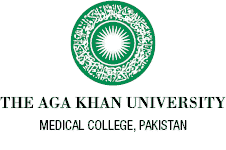The goals of the Centre for Bioinformatics and Computational Biology
The aim of the group was to establish biorepository as a scientific field at AKU and particularly to:
- Identify the genetic markers of health and disease relevant to maternal and child populations
- Employ a multi-omics approach encompassing genomics, transcriptomics, proteomics, and metabolomics using integrative machine learning strategies
- Analyze omics data at the Aga Khan University and utilize it to resolve population level health concerns
The objectives of the centre are to:
- Consolidate the Medical College-wide bioinformatics resources under one roof so that all researchers can benefit through a pay-per-service model.
- Strengthen local capacity in Bioinformatics by conducting workshops and offering internships.
- Develop a graduate-level Bioinformatics course that can be taught across streams in MPhil/PhD programs at AKU.
- Develop user-friendly analysis platforms and Bioinformatics pipelines.
- Attract funding to support the sustainability and growth of the centre.
- Develop national and international collaborations and increase the global footprint of the centre.
- Organize seminars and conferences to disseminate the information generated at the centre and invite global experts to share their knowledge.
Our approach is to generate a multi-disciplinary research capacity at the centre in omics data analysis and its interpretation. We aim to prepare a consolidated list of all research groups at the Medical College that could benefit from in-house Bioinformatics analysis and curate a list of software, reference datasets, and Bioinformatics pipeline that can be beneficial for the end-user.
We aim to establish quality control metrics and standards to benchmark Bioinformatics pipelines and tools. We are working in collaboration with the departments of Pathology and Laboratory Medicine to expand next-generation sequencing or NGS-based diagnostics for humans and pathogen genomics for clinical diagnostics.
We are also engaged with local, provincial, and national policymakers to promote Bioinformatics skills and next-generation sequencing (NGS) data analyses to address focused research questions.
Our aim is to become a regional centre of excellence in Bioinformatics and build capacity in the field.


